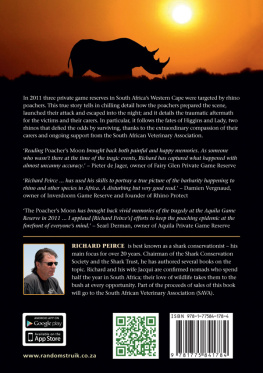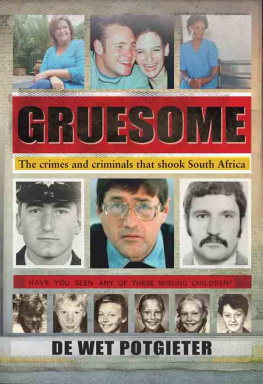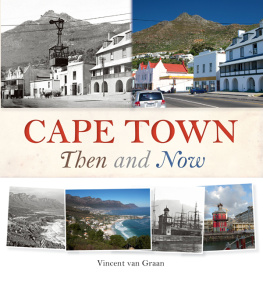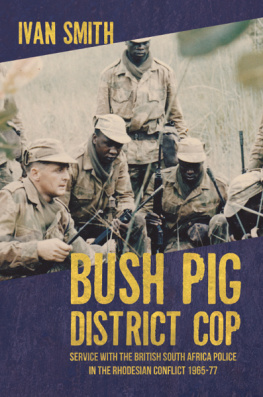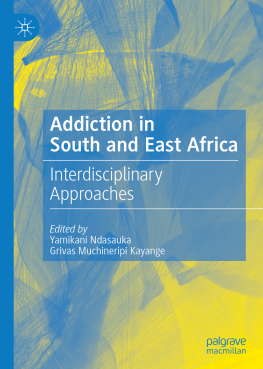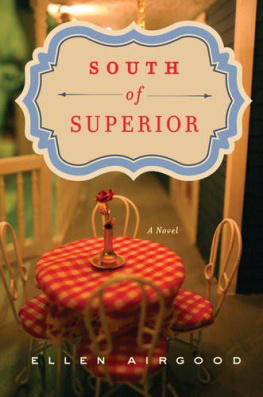Contents
Guide






Dealing in Death
Published by Zebra Press
an imprint of Penguin Random House South Africa (Pty) Ltd
Reg. No. 1953/000441/07
The Estuaries No. 4, Oxbow Crescent, Century Avenue, Century City, 7441
PO Box 1144, Cape Town, 8000, South Africa
www.penguinrandomhouse.co.za


New edition first published 2018
1 3 5 7 9 10 8 6 4 2
Publication Zebra Press 2018
Text Sylvia Walker 2018
Cover images Sylvia Walker (graffiti wall in Lavender Hill);
Gallo Images/Neil Baynes (Ellen Pakkies); Die Son/Denvor De Wee (tik users)
All rights reserved. No part of this publication may be reproduced, stored in a retrieval system or transmitted, in any form or by any means, electronic, mechanical, photocopying, recording or otherwise, without the prior written permission of the copyright owners.
PUBLISHER: Marlene Fryer
EDITOR: Ronel Richter-Herbert
COVER DESIGNER: Ryan Africa
TYPESETTER: Ryan Africa
Set in 11.5 pt on 16.5 pt Adobe Caslon
ISBN 978 1 77609 399 1 (print)
ISBN 978 1 77609 400 4 (ePub)
For my father, Sydney Bode. You are always beside me.
Contents
This book would not have been possible without people people who gave freely of their time in order to provide insight into the hidden world of addiction and the heart-wrenching issues that face those living with addiction.
Llewellyn Jordaan from the New World Foundation provided me with a rich understanding of the Cape Flats and the tragic history of some of these communities.
Adnaan Kemps personal story offered hope despite all the negativity that is encountered when researching a subject such as this.
Advocate Adrian J. Samuels, who led the defence in Ellen Pakkiess trial, deserves a special mention for giving up his valuable time to contribute to this book. His keen interest in the case, and his insights and thought-provoking points of view, provided great inspiration from a legal perspective.
To the mothers of addicted children who were willing to share their stories, even if they wished to remain anonymous, my sincere thanks. Your experiences have been invaluable in the completion of this book, despite the fact that I feel as if I have perhaps only scratched the surface. It is a book that can and should be written and rewritten a hundred times over until real, workable solutions are found for families living with addiction.
And lastly, Ellen Pakkies must be acknowledged for being the catalyst in this project. While the problem of addiction and tik is a frequent topic of discussion, the events that took place at Dover Court, Lavender Hill, on 12 September 2007 catapulted the issue into the limelight. Ellen walked a road that all mothers dread, and if her ordeal can help just one mother in a similar position, then her journey has not been in vain.
Over the past two decades, substance abuse has become one of post-apartheid South Africas most serious developmental challenges. It is a leading contributor to the national burden of disease, and it is at the root of more than half of all violent crime. In the Western Cape, where Sylvia Walkers narrative is set, the police estimate that about 70 per cent of violent criminal cases in urban centres are related to alcohol or drug abuse. Much of this is domestic violence, while the huge illicit market that the illegal drug trade has created also drives gangsterism, international crime syndicates and organised community vigilantism in response. All of these social consequences have escalated dramatically with the introduction of methamphetamine in the region.
Methamphetamine, locally known as tik, has created serious problems for health and police authorities around the world because of the volatile behaviour it triggers. So much so that new rehabilitation techniques have had to be developed to address it, as traditional methods have proven to be ineffective.
Sylvia Walker offers a tragic study of its impact on the Western Cape. She combines a heartfelt biographical account of Ellen Pakkies, a Cape Town mother who killed her methamphetamine-dependent child, with well-researched and even-handed analysis of the effects of tik, and the future challenges that substance abuse poses in the region.
With the rapid spread of substance abuse in South Africa and internationally, this book is an invaluable resource that will help readers deepen their knowledge about the topic, while helping to break down some of the myths that have developed around it.
HELEN ZILLE
PREMIER OF THE WESTERN CAPE
This story just doesnt go away. Over a decade later, the story of a mother who murdered her child, defying all logic, still grips the public imagination. Although there are a handful of cases worldwide where parents murdered their children, very few of them were adult children.
The story of Abie and Ellen Pakkies happened in our own backyard; it brought to light the scourge of addiction and the horrific impact it has on families. Despite the extensive media coverage the story has received over the years, the problem of drugs and addiction is no less pandemic than when this crime was committed.
The latest statistics show that murder rates in Cape Town are double that of any other South African city, and the number of drug-related crimes in South Africa has increased almost threefold in the ten years since the Pakkies murder. A new, horrific street drug, nyaope, is claiming many lives, particularly in impoverished township areas.
But let me go back to the beginning of my story with Ellen Pakkies. I met Ellen a short while after her trial in early 2009. I had been aware of her story through the media, but had not followed it with particular vigour.
Ellen spoke to me about a dream that shed had that her life story would be published one day and asked me if I would write her book and have it published. I told her that it would be an honour, and I agreed to tackle the project.
I set about contacting a publisher, and Ellen and I signed an agreement with Oshun Books, then an imprint of Random House Struik (now Penguin Random House), to publish her life story. Ellen and I began the serious work at hand. We spent many hours together as she started telling me her story, beginning with her earliest childhood.
After a couple of sessions, Ellen appeared reluctant to meet with me she was too busy with other things, sometimes making excuses not to see me. It was strange, as she had been so passionate about the project just a few weeks before.
Next page


